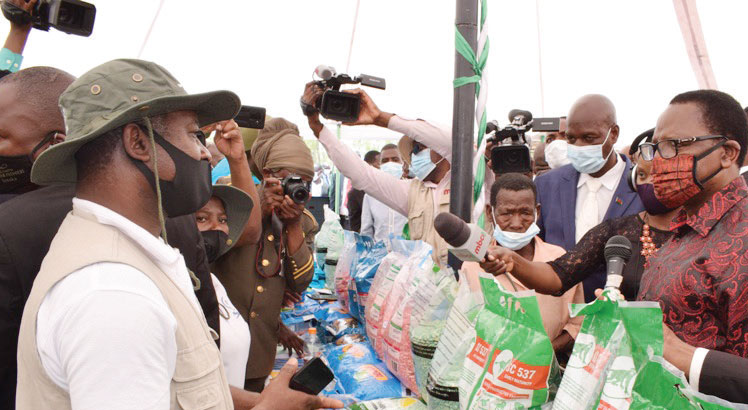Agro-dealers outline new AIP design fears
Seed Trade Association of Malawi (Stam) has expressed fear that the new Affordable Inputs Programme (AIP) design would have serious implications for the seed sector due to anticipated low redemption rate.
The association projects the worst seed redemption rate this year at 45 percent, which it estimates will be equivalent to K110 billion AIP loss.
The reaction followed Minister of Agriculture Lobin Lowe’s announcement two weeks ago that government contribution on seed will be fixed at K3 365 per 5 kilogramme (kg) seed pack, down from its K6 000 contribution this year.

launch of AIP in Zomba last year
The grouping said this means that the farmers’ contribution will be at K5 000 per 5 kg pack for maize seed or 7 kg pack of sorghum/rice seed.
In an interview yesterday, Stam business development officer Supply Chisi said most AIP beneficiaries are poor farmers, who will not be able to top up the required cash amount; hence, the projected low redemption rate.
He said: “Last year the redemption was below 80 percent for seed because AIP started late and also because some failed to top up the K2 000.
“With such low government contribution, redemption is estimated at 45 percent which is an equivalent of K110 billion AIP loss of value.”
Chisi said the development will also result in 55 percent of the beneficiaries planting farm-saved grain.
“This will have a direct negative impact on food security,” he warned.
In his announcement, Lowe assured that farmer contribution will be varying depending on the prevailing market prices of each cereal variety.
“The opening up of the farmer contribution on seed will give an opportunity to farmers to buy seed of their choice,” he said.
Lowe also announced an increase in farmer contribution towards the purchase of fertiliser from K4 495 to K7 500 per bag.
But Chisi said if farmers will be forced to use farm-saved grain, then the benefit of AIP fertiliser will not be realised as there is direct correlation between improved seed and fertiliser on yield.
He said during this year’s AIP, agrodealers are expected to handle in excess of K8.5 billion but feared that with the bulk of sales being based on cash, the risk profile of agrodealers changes significantly and impacts the confidence of seed companies to advance large quantities of seed on credit.
As a consequence, he said the situation will likely result in limited availability of seed, particularly in remote and hard-to-reach places; hence, impacting on farmers who may have to walk longer distances to access seed, thereby adding to the already high cost of purchase.
“Another challenge is that the companies planned and invested in seed production based on the assumption that government would contribute K6 000 minimum.
“So seed production is heavily affected as companies have already invested unlike last year, companies have stocks and no importation will be needed,” he said.





